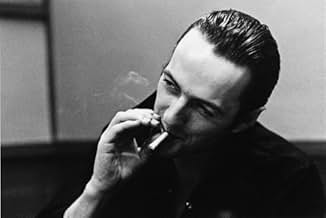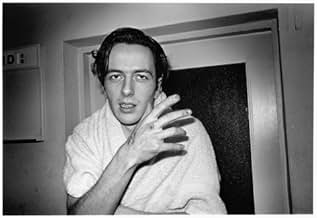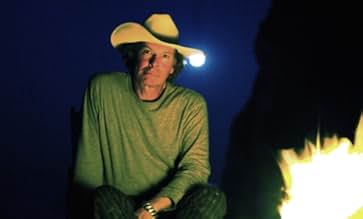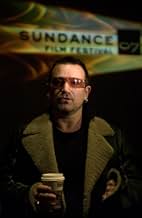CALIFICACIÓN DE IMDb
7.5/10
4.3 k
TU CALIFICACIÓN
Martin Scorsese, Bono, Jim Jarmusch, Flea y otras personas recuerdan la vida de Joe Strummer, cantante y guitarrista de la banda Clash.Martin Scorsese, Bono, Jim Jarmusch, Flea y otras personas recuerdan la vida de Joe Strummer, cantante y guitarrista de la banda Clash.Martin Scorsese, Bono, Jim Jarmusch, Flea y otras personas recuerdan la vida de Joe Strummer, cantante y guitarrista de la banda Clash.
- Premios
- 1 premio ganado y 4 nominaciones en total
Joe Strummer
- Self
- (material de archivo)
The 101ers
- Themselves
- (material de archivo)
Brigitte Bardot
- Self
- (material de archivo)
Mark 'Bez' Berry
- Self
- (as Bez)
Big Audio Dynamite
- Themselves
- (material de archivo)
The Clash
- Themselves
- (material de archivo)
Peter Cushing
- Winston Smith
- (material de archivo)
Argumento
¿Sabías que…?
- ConexionesFeatured in 'Joe Strummer': The Importance of Fire (2007)
Opinión destacada
On December 22, 2002, at the ripe young age of 50, John Graham Mellor - better known as Joe Strummer, co-founder, lyricist, rhythm guitarist and lead singer for the group The Clash - died, rather prosaically, of a heart attack. I say "prosaically" because one would reasonably have envisioned a somewhat more "exotic" and "respectable" end for a punk rock artist of Joe Strummer's caliber. Yet, perhaps it's not quite so strange after all, for like many of his musical contemporaries, Strummer lived his life in the fast lane, perhaps burning so intensely for such a brief period of time that his battered and overstretched heart simply couldn't keep up with all the demands placed on it after awhile (actually, we're told he suffered from a congenital heart condition of which he had no knowledge and which could have taken his life at any time).
Whatever the cause of his demise, the documentary "Joe Strummer: The Future is Unwritten" provides a compelling and really quite exhaustive look into the life and career of this punk music legend. The movie starts at the beginning with Mellor's birth in Ankara, Turkey, to a father who was a British diplomat and a mother who was a nurse. He had a generally unhappy childhood, being whisked from one country to another before eventually being deposited in a British boarding school, seeing very little of his parents during the seven year period in which they were living abroad.
The movie then goes on to chronicle the death of his older brother by suicide; Mellor's enrollment in art college (where he changed his name to Woody and formed his first band, The Vultures); his time living as a squator in some abandoned row houses in West London with a group of fellow musicians with whom he formed his second band, the 101's; and his eventual turning away from Rockabilly and towards punk when The Sex Pistols opened for his group one night and forever altered Mellor's view of what music could be and do. By this time he had already changed his name a second time - now he was to be known as Joe Strummer - and had become extremely adept at writing lyrics and playing rhythm guitar.
It was at this point in 1976 that he essentially abandoned his former friends and hooked up with Mick Jones, Paul Simonon and Nicky Headon to form the band The Clash. The film then records the rise of that group, emphasizing the driving energy and social commentary of its music, as Strummer, through his lyrics, boldly took on the political and military establishment, decrying civil injustice and examining the very nature of authority itself. In fact, the movie makes it clear that the punk movement itself represented a revolt not just against society as a whole but against previous styles of music and fashion - and even one's old friends and way of life, including, in Strummer's case, his pre-Clash band mates, many of whom agreed to be interviewed for this film.
In the latter stages, the movie explores the paradox of success and celebrity, especially for performers who base their art on railing against the very things they find themselves endorsing in the end: namely, conformity, commercialism, fame and self-indulgence. For The Clash this was exemplified by the "sellouts" of going to America, of achieving international acclaim with their 1979 album "London Calling," and of writing "hit" songs (most notably, of course, "Rock the Casbah"). This accelerating artistic ambiguity led to increased personal tension among the members of the band and the eventual dissolution of the group. Towards the end of his life, Joe turned to marriage and fatherhood and a career in the film industry both as an actor and a composer. But any attempt to revive his career as a singer, at least at first, ended in failure - some would suggest a failure largely calculated and imposed by the man himself. Yet, in his final years, a much more tranquil and mellow Joe began to emerge, managing to make "peace" between the hippies and the punkers by establishing outdoor music fests - affectionately labeled "Joe's Campfires" - to help bridge the gap. And, as an appropriate finale to his life, he embarked on a well-received tour with his last band, The Mescaleros.
Director Julien Temple has put together a surprisingly dense and visually imaginative film, one that is heavily reflective of the turbulent times in which it is set. In addition to interviews with former lovers and friends of Strummer, the movie provides generous helpings of file footage and home movies, as well as clips from films like "If ," "Animal Farm," "1984," etc. whose subject matters parallel elements of Joe's life and the era in which he lived. Temple also frequently interjects into the narrative animated versions of cartoons Joe himself drew over the years. Moreover, a number of familiar faces - Bono, Matt Dillon, Steve Buscemi, John Cusack, Jim Jarmusch, Courtney Love (who appeared with Strummer in the movie "Straight to Hell"), even Johnny Depp in full Jack Sparrow regalia - stop by to throw their two-cents-worth in as to how profoundly they were influenced by Joe and the music of the Clash. And, of course, above it all there is the music
But the true coup here is getting Joe himself to comment posthumously on his own life, thanks to the ready availability of interviews he gave at crucial moments during his career. This allows us to hear the man relate his own story in his own words. It may be a story that ends sadly, but not before Joe seems to find some genuine peace in his life. And, seriously, how many documentaries about a rock star can one say THAT about?
Whatever the cause of his demise, the documentary "Joe Strummer: The Future is Unwritten" provides a compelling and really quite exhaustive look into the life and career of this punk music legend. The movie starts at the beginning with Mellor's birth in Ankara, Turkey, to a father who was a British diplomat and a mother who was a nurse. He had a generally unhappy childhood, being whisked from one country to another before eventually being deposited in a British boarding school, seeing very little of his parents during the seven year period in which they were living abroad.
The movie then goes on to chronicle the death of his older brother by suicide; Mellor's enrollment in art college (where he changed his name to Woody and formed his first band, The Vultures); his time living as a squator in some abandoned row houses in West London with a group of fellow musicians with whom he formed his second band, the 101's; and his eventual turning away from Rockabilly and towards punk when The Sex Pistols opened for his group one night and forever altered Mellor's view of what music could be and do. By this time he had already changed his name a second time - now he was to be known as Joe Strummer - and had become extremely adept at writing lyrics and playing rhythm guitar.
It was at this point in 1976 that he essentially abandoned his former friends and hooked up with Mick Jones, Paul Simonon and Nicky Headon to form the band The Clash. The film then records the rise of that group, emphasizing the driving energy and social commentary of its music, as Strummer, through his lyrics, boldly took on the political and military establishment, decrying civil injustice and examining the very nature of authority itself. In fact, the movie makes it clear that the punk movement itself represented a revolt not just against society as a whole but against previous styles of music and fashion - and even one's old friends and way of life, including, in Strummer's case, his pre-Clash band mates, many of whom agreed to be interviewed for this film.
In the latter stages, the movie explores the paradox of success and celebrity, especially for performers who base their art on railing against the very things they find themselves endorsing in the end: namely, conformity, commercialism, fame and self-indulgence. For The Clash this was exemplified by the "sellouts" of going to America, of achieving international acclaim with their 1979 album "London Calling," and of writing "hit" songs (most notably, of course, "Rock the Casbah"). This accelerating artistic ambiguity led to increased personal tension among the members of the band and the eventual dissolution of the group. Towards the end of his life, Joe turned to marriage and fatherhood and a career in the film industry both as an actor and a composer. But any attempt to revive his career as a singer, at least at first, ended in failure - some would suggest a failure largely calculated and imposed by the man himself. Yet, in his final years, a much more tranquil and mellow Joe began to emerge, managing to make "peace" between the hippies and the punkers by establishing outdoor music fests - affectionately labeled "Joe's Campfires" - to help bridge the gap. And, as an appropriate finale to his life, he embarked on a well-received tour with his last band, The Mescaleros.
Director Julien Temple has put together a surprisingly dense and visually imaginative film, one that is heavily reflective of the turbulent times in which it is set. In addition to interviews with former lovers and friends of Strummer, the movie provides generous helpings of file footage and home movies, as well as clips from films like "If ," "Animal Farm," "1984," etc. whose subject matters parallel elements of Joe's life and the era in which he lived. Temple also frequently interjects into the narrative animated versions of cartoons Joe himself drew over the years. Moreover, a number of familiar faces - Bono, Matt Dillon, Steve Buscemi, John Cusack, Jim Jarmusch, Courtney Love (who appeared with Strummer in the movie "Straight to Hell"), even Johnny Depp in full Jack Sparrow regalia - stop by to throw their two-cents-worth in as to how profoundly they were influenced by Joe and the music of the Clash. And, of course, above it all there is the music
But the true coup here is getting Joe himself to comment posthumously on his own life, thanks to the ready availability of interviews he gave at crucial moments during his career. This allows us to hear the man relate his own story in his own words. It may be a story that ends sadly, but not before Joe seems to find some genuine peace in his life. And, seriously, how many documentaries about a rock star can one say THAT about?
- Buddy-51
- 24 oct 2009
- Enlace permanente
Selecciones populares
Inicia sesión para calificar y agrega a la lista de videos para obtener recomendaciones personalizadas
- How long is Joe Strummer: The Future Is Unwritten?Con tecnología de Alexa
Detalles
Taquilla
- Total en EE. UU. y Canadá
- USD 248,362
- Fin de semana de estreno en EE. UU. y Canadá
- USD 20,880
- 4 nov 2007
- Total a nivel mundial
- USD 1,193,491
- Tiempo de ejecución2 horas 4 minutos
- Color
- Mezcla de sonido
Contribuir a esta página
Sugiere una edición o agrega el contenido que falta

Principales brechas de datos
By what name was Joe Strummer: The Future Is Unwritten (2007) officially released in Canada in English?
Responda

































